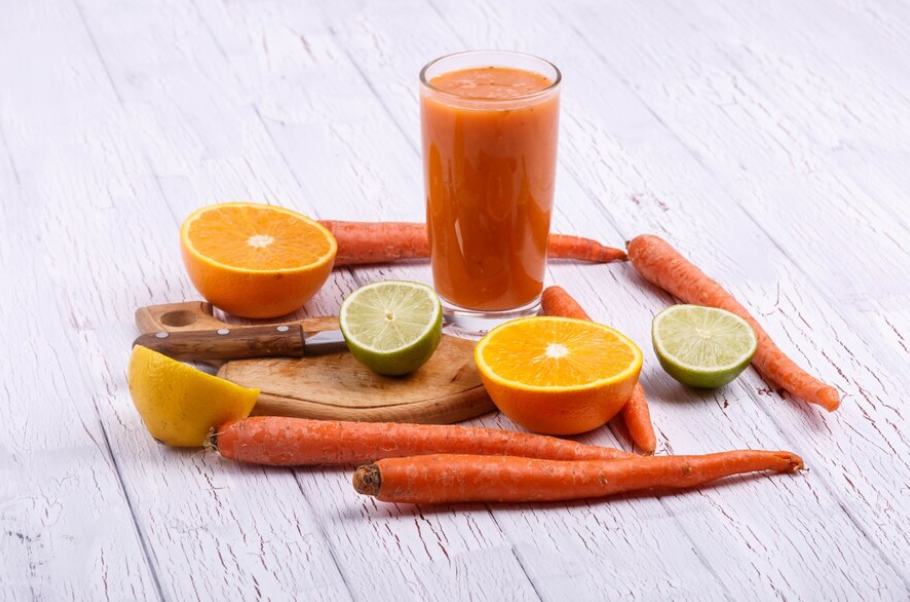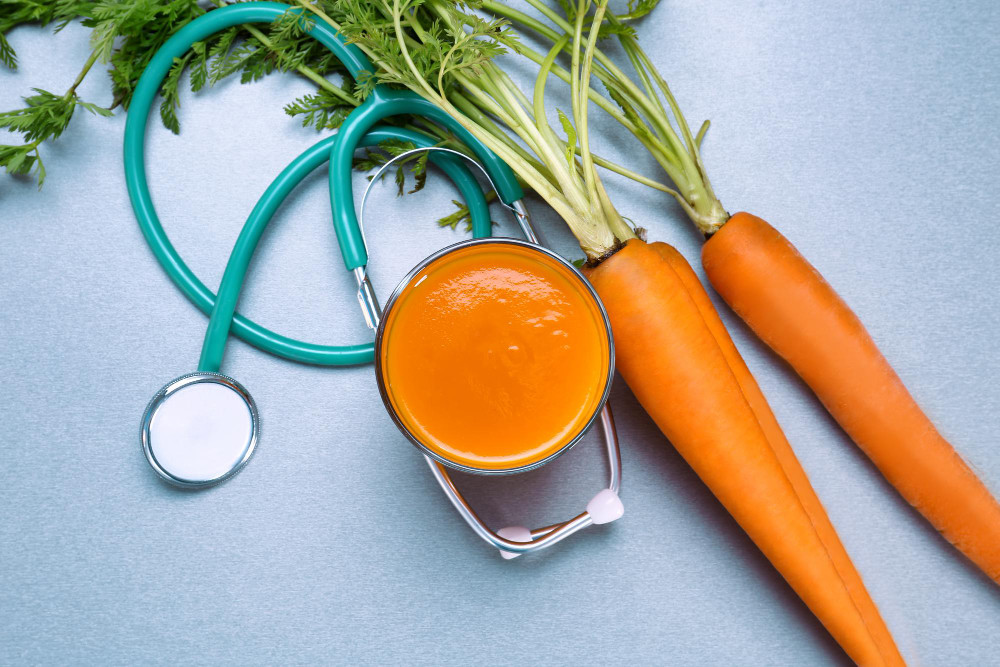The Powerhouse Benefits of Carrot Juice

©️ Freepik
For generations, carrots have been lauded as a superfood for eyesight, thanks to the iconic phrase “Carrots help you see in the dark.”
But the truth is, their benefits extend far beyond vision. Turning these vibrant orange vegetables into juice unlocks a concentrated dose of nutrients, making carrot juice a potential powerhouse for overall health.
A Nutritional Breakdown: What’s Packed Inside Carrot Juice?
One cup (236 grams) of carrot juice offers a surprisingly robust nutritional profile. Here’s a glimpse into the key players:

- Beta-Carotene: This carotenoid, responsible for the bright orange color in carrots, gets converted to vitamin A in the body. Vitamin A is essential for healthy vision, cell growth, and a robust immune system.
- Vitamin C: Acting as a potent antioxidant, vitamin C shields your cells from damage and supports collagen production, vital for healthy skin and connective tissues.
- Potassium: This essential mineral helps regulate blood pressure and muscle function.
- Fiber: While juicing removes some fiber from whole carrots, some may still be present, aiding digestion and promoting gut health.
- Other Vitamins and Minerals: Carrot juice also boasts smaller amounts of vitamins B6, K1, and minerals like manganese and magnesium, contributing to various bodily functions.
Beyond the Hype: Exploring the Evidence-Based Benefits of Carrot Juice
While some health claims surrounding carrot juice lack strong scientific backing, there are promising benefits supported by research. Here’s a closer look:
1. Eye Health Champion
Beta-carotene’s conversion to vitamin A plays a crucial role in maintaining healthy vision.
Studies suggest that adequate vitamin A intake can help prevent age-related macular degeneration (AMD), a leading cause of vision loss in older adults, and cataracts, a clouding of the eye’s lens.

2. Immunity Booster
Vitamin C and the antioxidants in carrot juice join forces to strengthen your immune system. Vitamin C helps white blood cells function optimally, your body’s first line of defense against infections.
3. Skin Savior
Vitamin A and antioxidants in carrot juice may promote healthy skin cell turnover. This can potentially lead to a more radiant complexion and even help protect against sun damage.
4. Weight Management Potential
Carrot juice is naturally low in calories and fat. While not a magic bullet for weight loss, it can be a hydrating and filling addition to a balanced diet. The high water content in carrot juice can help you feel fuller for longer, potentially reducing calorie intake throughout the day.
5. Heart Health Hero (Maybe)
Some research suggests carrot juice may contribute to lower cholesterol and blood pressure levels, reducing the risk of heart disease. However, more well-designed studies are needed to confirm this benefit definitively.
6. Antioxidant Powerhouse
Packed with antioxidants like beta-carotene and other carotenoids, carrot juice helps combat free radicals, the unstable molecules that damage cells and contribute to chronic diseases such as heart disease and cancer.

Carrots and Cancer: Promising Research, But Not a Cure
Studies investigating the link between carrot juice consumption and cancer prevention are ongoing. While some initial research shows a potential association between higher carrot intake and a reduced risk of certain cancers, more robust studies are needed to draw definitive conclusions.
It’s important to remember that carrot juice is not a cure for cancer and should be seen as a part of a healthy lifestyle, not a replacement for evidence-based cancer treatment.
Beyond the Benefits
While carrot juice offers a wealth of benefits, moderation is key. Here are some things to keep in mind:
Sugar Content
The concentrated nature of juice means it’s also higher in sugar than whole carrots. One cup of carrot juice can contain up to 12 grams of sugar, which can be detrimental to health if consumed in excess. Consider diluting it with water or combining it with other low-sugar vegetables like cucumbers or celery in a juice blend.

Fiber Loss
Juicing removes most of the fiber from carrots. Fiber plays a crucial role in digestion, gut health, and promoting satiety.
To ensure you are getting enough fiber, pair your carrot juice with whole fruits and vegetables.
Nutrient Dilution
While juice offers a concentrated dose of some vitamins, it may lack other beneficial nutrients present in whole carrots. Aim for a balanced diet that includes both whole carrots and occasional glasses of carrot juice.
You may also like: Celery Juice Cleanse: What Is It and Does It Actually Work?


